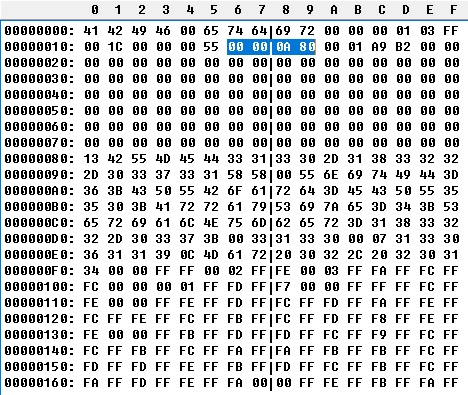I am very confused. I need to read binary files (.fsa extension by Applied Biotechnology aka ABIF, FASTA files) and I ran into a problem reading signed integers. I am doing everything according to this manual https://drive.google.com/file/d/1zL-r6eoTzFIeYDwH5L8nux2lIlsRx3CK/view?usp=sharing So, for example, let's look at the fDataSize field in the header of a file https://drive.google.com/file/d/1rrL01B_gzgBw28knvFit6hUIA5jcCDry/view?usp=sharing
I know that it is supposed to be 2688 (according to the manual, it is a signed integer of 32 bits), which is 00000000 00000000 00001010 10000000 in binary form. Indeed, when I read these 32 bits as an array of 4 bytes, I get [0, 0, 10, -128], which is exactly the same in binary form.
However, if I read it as Integer, it results in 16809994, which is 00000001 00000000 10000000 00001010 in bits.
As I understood from multiple forums, they use Swap and htonl functions to convert integers from little-endian order to big-endian. They also recommend using BSWAP EAX instruction for 32bit integers. But in this case they work in a kind of wrong way, specifically: Swap, applied to 16809994, returns 16779904 or 00000001 00000000 00001010 10000000, and BSWAP instruction converts 16809994 to 176160769, i.e. 00001010 10000000 00000000 00000001
As we can see, built-in functions do something different from what I need. Swap is likely to return the correct result, but, for some reason, reading these bits as an Integer changes the left-most byte. So, what is wrong and what do I do?
Upd. 1 For storing the header data I use the following record:
type
TFasMainHeader = record
fFrmt : array[1..4] of ansiChar;
fVersion : Word;
fDir : array[1..4] of ansiChar;
fNumber : array[1..4] of Byte; //
fElType : Word;
fElSize : Word;
fNumEls : array[1..4] of Byte; //
fDataSize : Integer;
fDataOffset : Integer;
fDO : word;
fDataHandle : array[1..98] of Byte;
end;
Then upon the button click I perform the following:
aFileStream.Read(fas_main_header, SizeOf(TFasMainHeader));
with fas_main_header do begin
if fFrmt <> 'ABIF' then raise Exception.Create('Not an ABIF file!');
fVersion := Swap(fVersion);
fElType := Swap(fElType);
fElSize := Swap(fElSize);
...
Next I need to swap Int32 variables in the right way, but at this point fDataSize, for example, is 16809994. See the state of the record in detail during debugging:
It doesn't make sense to me since there shouldn't be a one-bit in the binary representation of fDataSize value (it also screws the BSWAP result).
See the binary structure of the file beginning (fDataSize bytes are highlited):



Swapbecause it swaps the two bytes of a 16-bit integer. – Moreville00000000 00000000 00001010 10000000in binary (00 00 0A 80in hex) and big endian. I just used a hex editor to create a file containing only this data and loaded these bytes into a DelphiIntegervariable. This value is thus interpreted as -2146828288. ApplyingBSWAP, however, yields 2688, as expected. – Moreville